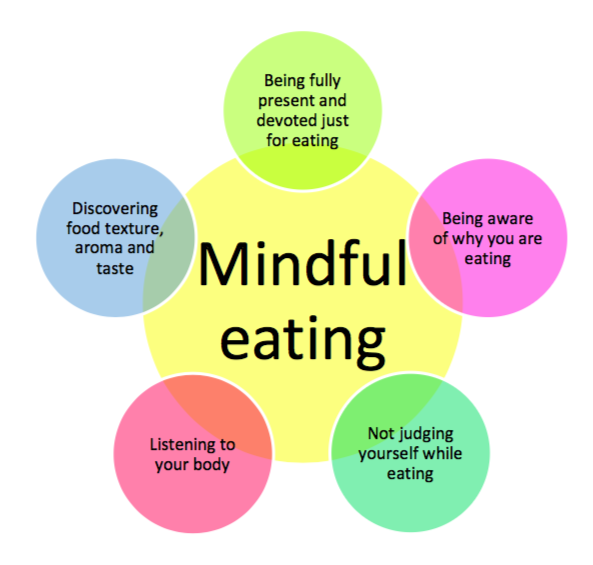Mindfulness means being aware and in the moment.
Mindful eating encourages you to think about what you are eating and why you are eating it.
Sometimes we eat without paying attention to what our body needs or if we are hungry or not. This might be because we are preoccupied, worried, stressed or distracted. Mindfulness encourages us to recognize these preoccupations in order to free our mind and focus on the present moment.
- It asks you to think and consider all of the advice we have given you about ‘healthy plates’ and portion sizes that are right for you.
- It asks you to try to enjoy the flavours and textures and smells of what you are eating.
- It asks you to eat slowly and chew well. By doing this, we will recognize when we are full and may avoid over eating.
- It may help keep our gestational weight changes on track.
- It may help us control our blood sugar levels.
Main concepts of mindful eating are:

Dietitian Sedra Jundi explains mindful eating.

Audio Only
So how can you achieve mindful eating?
Before You Start
It is important to eat three meals and three snacks daily.
If you feel like eating more than this:
- Reflect before eating.
- Are you rushed? Stressed? Sad? Bored? Hungry? If you are stressed or bored or sad, try to nourish your emotional needs without food: have a walk, meditate, shower, read, talk to a friend, listen to some music, sing, dance
- And if you really feel hungry, then, think of what to eat, and how to eat. Take a look at our healthy snack suggestions.
Even if you are eating a regular meal or snack, keep the healthy plate and portions in mind. If you are tempted to eat beyond this, take the time to reflect on why and decide if it is really hunger. If not, think about other things you might do to feel better.
Plan your meals and prepare them mindfully
Choose food for both pleasure and nourishment using all the healthy tips you learned on our website.
When you already know what to eat and how much to eat, you will not be mindless while eating.
- Make a list of your meals and schedule them on your calendar.
- Make your grocery list and don’t forget to schedule your trip to the grocery store. (see Smart Shopping)
Don’t Eat and Run: Instead of eating at the kitchen counter while standing up, have a seat; respect meal times and be present in the moment with the meal in front of you.
Create a pleasant eating environment: a table without clutter? Some flowers?
When You Eat
Eat slowly and listen to your body:
- Leave your utensil on the table between bites.
- Take a moment to breath and listen to your body cues: it takes time for your brain to hear that you are full.
- Take one small bite at a time.
- Get at least 10 chews for each bite (it will vary by what you are eating).
- Don’t jump to the next bite before you have finished this one or until your mouth is completely empty of this bite.
Enjoy your food: Whether you are in a fancy restaurant or you are eating leftovers, eat carefully and fully appreciate the moment.
- Feel the flavors, the tastes, the smells, and the textures in your mouth before you swallow.
- Pay attention to every little sensation you feel because of each individual bite.
- Even food you consider forbidden, you can enjoy it in moderation, every now and then. The more you forbid yourself the more the craving you have for that food.
Be fully present:
- Turn off the T.V. & your phone, tablet, computer or any electronic devices within eyesight that can serve as distractions from focusing on the taste and overall pleasure of eating.
- Family and friend meals are a great way to connect with one another and share enjoyment of a meal. However, try not to eat more just because someone else goes for seconds!
Be aware of how much you are eating:
- Using a smaller plate will help you eat less because, the larger the plate the more the urge you have to fill all of your plate while serving yourself. Remember portion sizes and the healthy plate.
- Don’t eat straight from the bag or the box. This leads to you being totally unaware of how much you are eating.
- Whenever you feel full, you don’t have to overstuff yourself- consider packing the leftovers even if they were few bites.
Remember!
Don’t skip meals: Waiting too long before you eat will lead to hunger spikes that increase your cravings and make you grab large quantities of food high in fat, salt and sugar.
Have a Strong will: Finally, a strong-willed dedication is very essential in order to get the benefits of mindful eating and to offer yourself and your baby the best nutrition with the best pregnancy and fetal outcomes.
The more you do it, the easier it will get!

